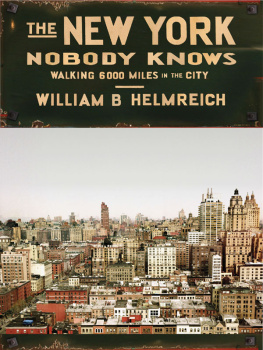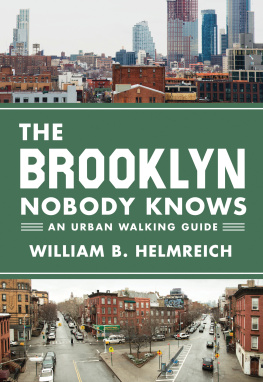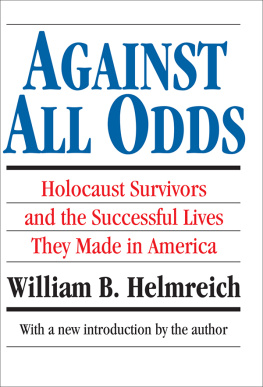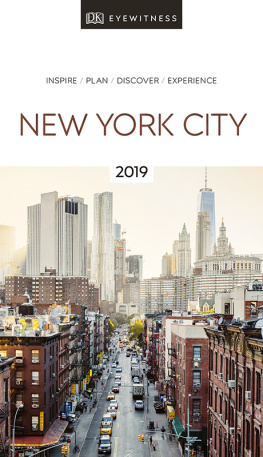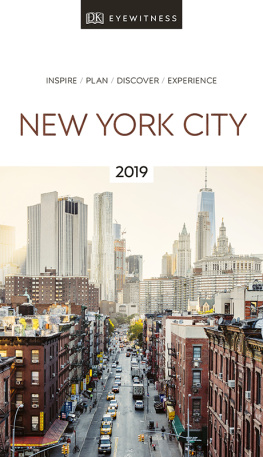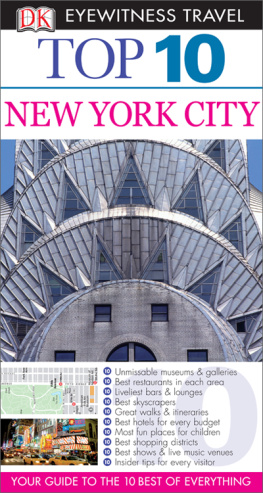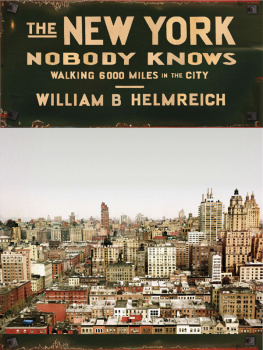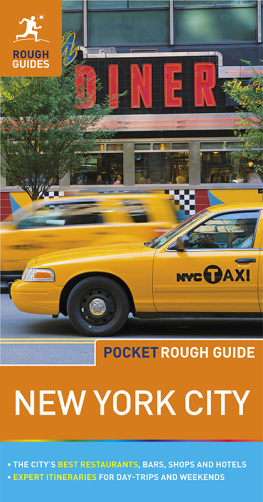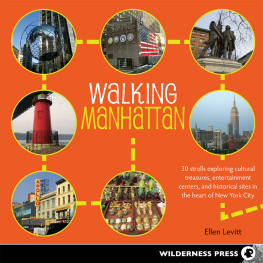
THE NEW YORK NOBODY KNOWS
THE NEW YORK
NOBODY KNOWS
WALKING 6,000 MILES IN THE CITY
WILLIAM B. HELMREICH
PRINCETON UNIVERSITY PRESS
PRINCETON AND OXFORD
Copyright 2013 by Princeton University Press
Published by Princeton University Press, 41 William Street,
Princeton, New Jersey 08540
In the United Kingdom: Princeton University Press, 6 Oxford Street,
Woodstock, Oxfordshire OX20 1TW
press.princeton.edu
Various selections from the book My Korean Deli by Ben Ryder Howe.
Copyright 2011 by Ben Ryder Howe. Reprinted by permission of Henry Holt and Company, LLC. CAUTION: Users are warned that these selections are protected under copyright laws and downloading is strictly prohibited. The right to reproduce or transfer these selections via any medium must be secured from Henry Holt and Company, LLC.
All Rights Reserved
Sixth printing and first paperback printing, 2015
Paperback ISBN 978-0-691-16970-5
The Library of Congress has cataloged the cloth edition of this book as follows:
Helmreich, William B.
The New York nobody knows : walking 6,000 miles in the city / William B. Helmreich.
pages cm
Includes bibliographical references and index.
ISBN 978-0-691-14405-4 (alk. paper)
1. New York (N.Y.)Social conditions21st century. 2. New York (N.Y.)Social life and customs21st century. 3. New York (N.Y.)Civilization21st century. 4. NeighborhoodsNew York (State)New York. 5. Community lifeNew York (State)New York. I. Title.
HN80.N5H45 2013
306.097471dc23 2013017223
British Library Cataloging-in-Publication Data is available
This book has been composed in Sabon with Helvetica Neue for display
Printed on acid-free paper.
Printed in the United States of America
7 9 10 8 6
TO MY FATHER
PREFACE
W hen I was nine years old my father devised a game to keep me entertained. It was called Last Stop. We lived on Manhattans . Whenever he was free on the weekend, we walked to the local 103rd Street stop on the IND (Independent Subway System) line. From that subway we would transfer to another train and take that to the last stop on the line. Upon exiting we would explore the neighborhood on foot for a couple of hours, sometimes taking a city bus to further extend our trip. When we ran out of last stops on the various lines, wed move the destination point to the third-to-last or some other stop. We played this game off and on for about five years until I began high school.
Thats how I learned to love and appreciate New York City. I would stand with my father, looking out on the marshes that were in Brooklyns in the Bronx, and I saw men fishing. I marveled at the sight, having never before seen anyone fish. I was a city kid. I played stickball, belonged to what passed for a gang on my block, and knew every chocolate bar in my local candy store. These experiences and the trips I took were the fertile ground where the idea for this book grew. As for my father, he continued walking well into his eighties, extolling its health benefits. He died of natural causes in 2011, three weeks shy of his 102nd birthday, so I guess he was right.
I have been teaching a graduate course on New York City at either City College of New York or the CUNY Graduate Center for forty years. Its a great place to do so because so many of my colleagues have done outstanding work on the city. Their collective works rival that of the University of Chicago scholars of the 1920s who went out and explored their city in similar fashion.
Besides reading extensively on the subject and writing papers, as part of my course my students go out walking with me for full days to explore the different boroughs. Many are from other countries, and its a fascinating experience for them to see what I often refer to as the greatest outdoor museum in the world. They are invariably surprised and delighted to learn that all the boroughs are unique and interesting in their own right.
One day my chairman at CUNY Graduate Centers sociology department, Philip Kasinitz, remarked to me almost offhandedly, Youve been teaching about New York for so long. Why dont you just write a book about it? I thought about what he said and suddenly realized that I had probably wanted to do just that my whole life. And so I decided to do it. I was also inspired by Joseph Bergers 2007 book, The New New York. As a journalist for the New York Times, Berger has covered the city for decades, and his volume is a marvelous travelogue through many of the citys ethnic neighborhoods, filled with information and fascinating insights about them and their people.
The fact that Ive lived in New York for most of my life was a tremendous advantage. Id walked much of the city many times beforeby myself, with my students, for pleasure, or simply because I was going somewhere. But there was one huge difference between those walks and the journey I was about to undertake: I had never walked the city systematically, block by block, and for the purpose of writing a book. This greatly increased my focus, for now everything I did counted. It had to be apprehended, described, and analyzed. All my senses were alert and my brain was moving in high gear.
Another benefit was that not only had I grown up in New York, but I had also worked here in various capacities. In my younger days I had been a caseworker for the welfare department, a waiter and a busboy, a cabbie, and a researcher on various projects ranging from one on the homeless, to another on voting behavior, to interviews with people about food preferences, flooring, telephone use, and many other marketing studies. I have also lived in other parts of New York besides where I grew up.
Finally, there was the fact that Ive lived in other cities tooAtlanta, St. Louis, New Haven, and elsewhere. This and brief stays in other cities around the world gave me a comparative perspective, the ability to see what made the Big Apple both unique and similar to other metropolises. Armed with this information and my personal background, I set out on what was to become a transformative journey, one in which I experienced and learned more than I could possibly ever have imagined.
ACKNOWLEDGMENTS
A large-scale project of this sort will inevitably have many debts to acknowledge and I do so with great pleasure. I want to first thank Peter Dougherty, director of Princeton University Press, for believing in this idea and giving me the opportunity to realize it. I am also indebted to my editor, Eric Schwartz, for his careful guidance, support, and enthusiasm, even to the point of traveling with me to various parts of the city. Jill Hughes, my copyeditor, played an important role in improving and polishing the manuscript, as did Senior Production Editor Kathleen Cioffi. Kudos too, to Jessica Pellien, Assistant Publicity Director, for her efforts on my behalf. Many thanks to all the other people at Princeton who helped me. Its a privilege to work with such a great group of people.
Im especially appreciative of the past mayors of New York City, each of whom gave generously of their time and shared very valuable insights and reflections with me: Rudolph Giuliani, Michael Bloomberg, David Dinkins, and the late Edward Koch.
My gratitude to my colleagues and other knowledgeable people who evaluated and commented on my work at various stages cannot be overstated. Im especially thankful to Roger Waldinger, Mitchell Duneier, Elijah Anderson, John Mollenkopf, Peter Moskos, Alford Young Jr., and Paul and Irene Marcus. Others who greatly sharpened my focus, saved me from errors, and enhanced my understanding of the subject include Richard Alba, Bill Kornblum, Phil Kasinitz, Nancy Foner, Herbert Gans, Cynthia Fuchs Epstein, Sharon Zukin, Mary Clare Lennon, Joseph Berger, Sheldon and Tobie Czapnik, Leslie Paik, Reuben Jack Thomas, Mary Curtis, Keith Thompson, Ramona Hernandez, Mildred Green, Alan Helmreich, Denise Helmreich, Danny Frankel, Jack Nass, Eli Goldschmidt, Joan Downs, Steven Goldberg, Allan Rudolf, Roslyn Bologh, Esther Friedman, Sylvia Barack-Fishman, David Halle, Gabriel Haslip-Viera, Maritsa Poros, Lily Hoffman, LHeureux Lewis-McCoy, Mehdi Bozorgmehr, Parmatma Saran, Howard Fuchs, Jim Biles, Katherine Chen, Chudi Uwazaurike, Iris Lopez, Francis Terrell, Robert Katz, Susan Tanenbaum, Arline McCord, Zach Dicker, Stephen Rabinowitz, Stuart Feintuch, Erwin Fried, Bill Green, Sanford Goldfless, Albert Weinstein, David Stetch, Jeffrey Wiesenfeld, Nomi Rabinowitz, Amnon Shiloach, Samuel Heilman, Jeffrey Gurock, Philip Jacobs, Sydelle and Robert Knepper, Archie Dykes, Ivan and Lisa Kaufman, Rona Woldenberg, Martin Werber, Edward Wydra, Gil Wachstock, Philip Fishman, Pearl and Nathan Halegua, Daniel Vitow, Stuart Rubenfeld, Patrick Sharkey, Cordell Schachter, Gwen Dordick, Jack Levinson, Laura Bowman, Jack Wertheimer, Ira Salomon, Lisa Helmrich, Tom Schott, Jenna Snow, Evan Nass, and Deborah Van Amerongen. Special thanks also to my photographers, Jesse Liss and Bob Marcus.
Next page
